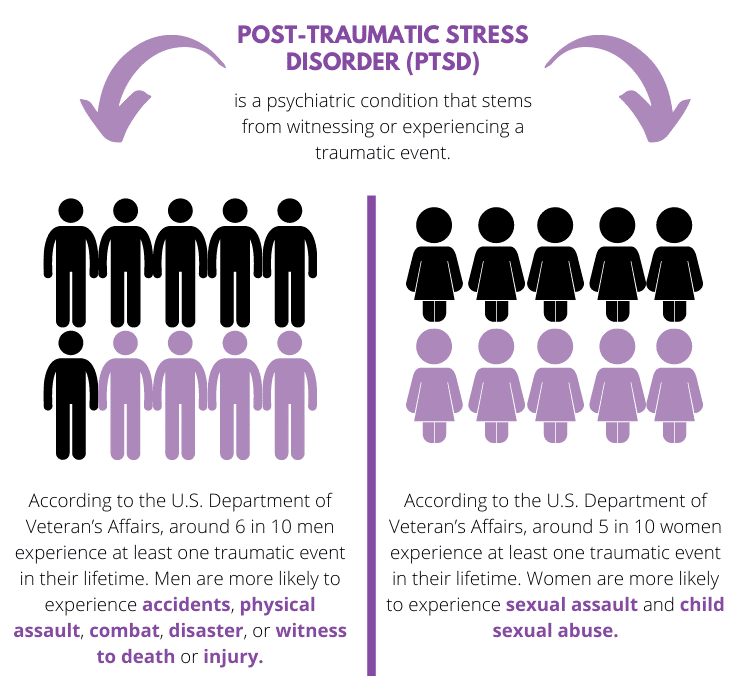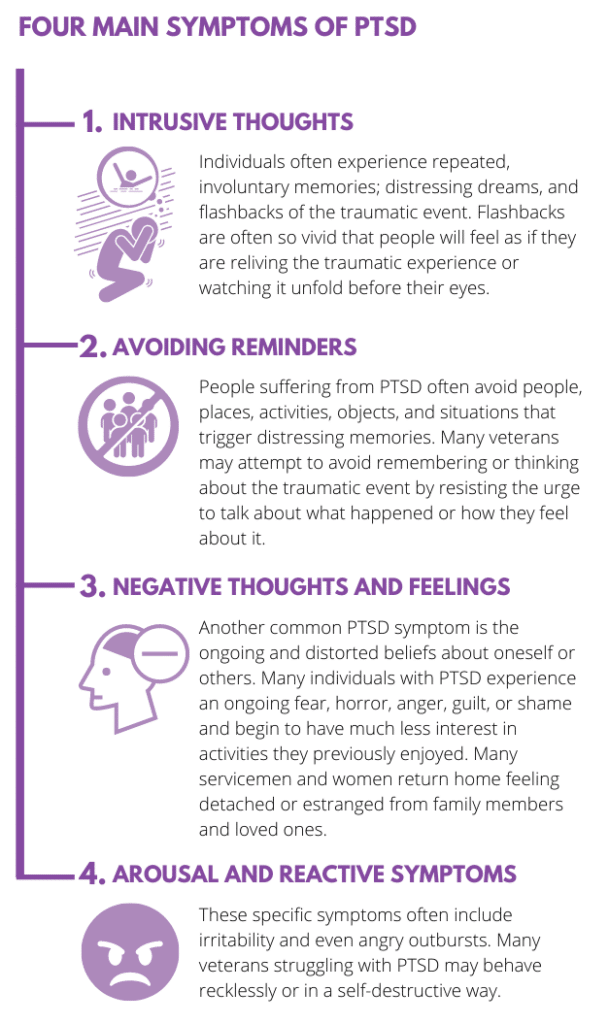Substance use disorders have been proven to have clear connections with specific risk factors. The main subject of intensive research is the link between post-traumatic stress disorder and substance use disorder. The presence of trauma is a clear risk factor for later developing a substance use disorder. The attempt to self-medicate often exacerbates the symptoms of PTSD, ultimately leading to a vicious cycle that is difficult to break. Furthermore, many of our brave veterans and active-duty servicemen and women return from military service with symptoms of PTSD.
Many veterans suffering from an addiction have an underlying co-occurring post-traumatic stress disorder. Once referred to as “shellshock” and later “battle fatigue,” PTSD is often caused by witnessing war events or other significantly tragic events. These symptoms can be triggered by anything that is a reminder of the traumatic incident and many veterans turn to substance abuse in order to self-medicate and cope with their pain. Fortunately, many veterans are covered with TRICARE insurance – a company that our mental health and substance abuse programs are in-network with.
What is PTSD?
Post-Traumatic Stress Disorder (PTSD) is a psychiatric condition that stems from witnessing or experiencing a traumatic event. According to the U.S. Department of Veteran’s Affairs, around 6 in 10 men and 5 in 10 women experience at least one traumatic event in their lifetime. Women are more likely to experience sexual assault and child sexual abuse while men are more likely to experience accidents, physical assault, combat, disaster, or witness to death or injury. While some people do recover from experiencing trauma, many others later develop PTSD – putting them at greater risk of developing a substance use disorder as well.

What are the symptoms of PTSD?
Individuals who experience PTSD often have intrusive, vivid thoughts and feelings associated with the trauma – long after exposure have ended. Many veterans relive the experience through night terrors, flashbacks, feelings of sadness, anger, fear, or detachment from loved ones. Often times, veterans struggling with PTSD will avoid triggers from the traumatic even by isolating from people or situations associated with the experience.
The American Psychiatric Association categorizes four main symptoms of PTSD:

These four main categories of symptoms are typically severe enough to affect an individual’s life. Many returning veterans experience their quality of life to be decreased significantly due to the looming symptoms of PTSD.
Veterans, PTSD, and Substance Abuse Treatment
Research suggests that as many as 45% of individuals suffering from PTSD also have a substance use disorder. When considering the complex symptoms of PTSD, it is not difficult to understand why many veterans turn to drugs and alcohol to cope with their co-occurring disorder. The body’s biological reaction to drugs and alcohol often exacerbates the symptoms of PTSD and creates a vicious cycle of addiction that can be difficult to stop without professional intervention.
PTSD and substance abuse have a complex, but an intertwined relationship that often affects the treatment of veterans. High levels of stress associated with PTSD and returning military men and women create a high-risk factor that they will turn to drugs and/or alcohol to temporarily subdue feelings of anxiety and cultivate feelings of relief. However, when the euphoric effects of other substances wear off, dopamine levels drop to increasingly lower levels. As the body becomes accustomed to this substance over time, the brain stops creating dopamine on its own and the user begins to seek more and more of the substance.
If a veteran is struggling with both PTSD and substance use disorder, it is essential to treat both conditions simultaneously to enhance the quality of life for the individual. Therapy for PTSD can reduce the symptoms of the disorder which can help an individual focus on recovering from their addiction as well. Dual diagnosis treatment focuses on mental health conditions and substance use disorders concurrently in order to achieve life-long sobriety. The overall goal of this type of treatment is to improve the overall quality of life, heal relationships, and restore veterans to their optimal level of functioning.
Does TRICARE Cover Dual Diagnosis Treatment at Agape?
TRICARE health insurance is similar to other medical insurance plans in regard to the various options available to individual policyholders. If you are an active-duty service member, a veteran, or a family member, it is likely that you can use TRICARE insurance to help cover the cost of drug and alcohol rehabilitation services. All of the available TRICARE plans either meet or exceed the standards established by the Affordable Care Act in order to ensure that individuals have the quality health insurance options to meet their specific needs. TRICARE offers coverage for dual diagnosis rehab if an individual’s plan meets the specific qualification requirements.
Agape Treatment Center in Fort Lauderdale, FL embraces a universal, comprehensive approach to substance abuse treatment that transcends regardless of circumstances. Our team is dedicated to providing individuals all over the country with the opportunity to achieve life long sobriety with our evidence-based therapy and counseling methods. Maintaining our mission, we are proud to announce that we are a certified TRICARE drug rehab facility.







